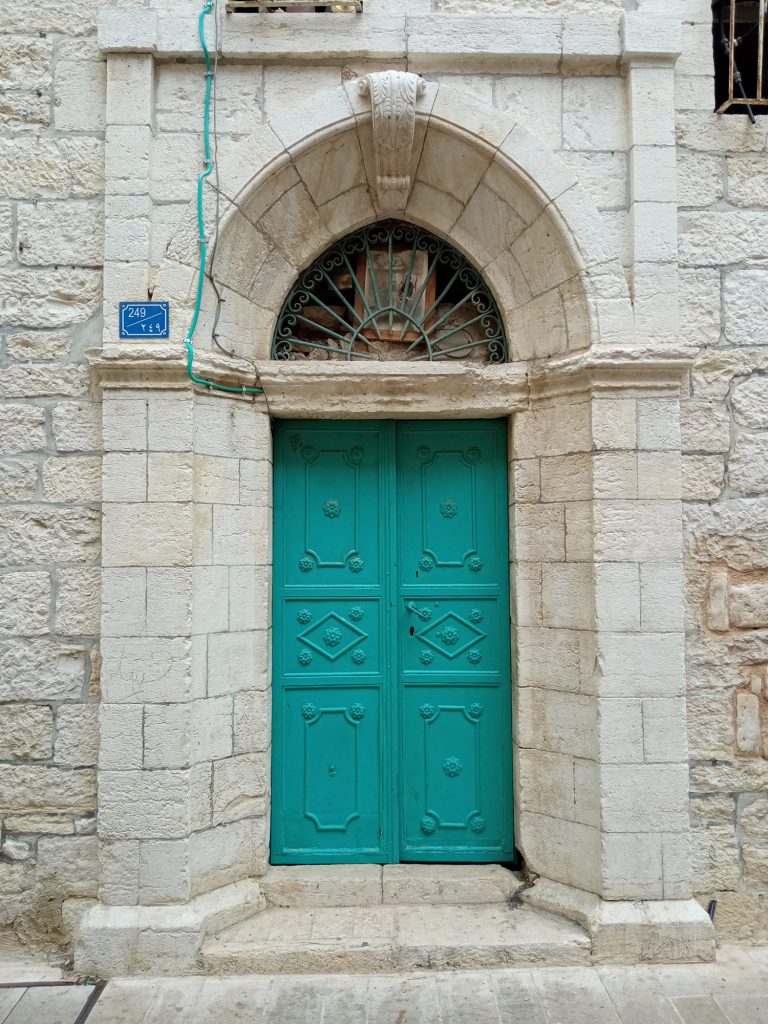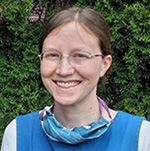by Eileen Kinch

As Israel hunts down Hamas militants with sweeping attacks throughout Palestinian territories, the devastation is felt by both Muslims and Christians. In the West Bank, faculty at Bethlehem Bible College cling to hope that Christian friends in Gaza hold on to life.
“Bethlehem has been under siege,” reported Andrew F. Bush on Oct. 31. A part of Methacton Mennonite Church (Norristown, PA), Bush directs the college’s Bethlehem Institute for Peace and Justice. “The Israeli Defense Forces’ closure of all the roads into Bethlehem is strangling its economy. With little money, families are conserving their resources. Few cars are on the road. Restaurants are closed.
“These troubles are light, though — and everyone in Bethlehem knows it — compared to the devastation of Gaza. The prevailing mood in the city … is one of depression and anger at the indiscriminate bombing in all parts of Gaza, and the thousands of innocent Palestinian lives lost, including 3,500 children.”
Although many foreigners streamed out of Bethlehem at the war’s outbreak in October, Bush felt his family needed to stay because the college’s peace studies program is more critical than ever.
“Staying is costly. It causes great anxiety for our adult children in the States,” he said. “We also must work through our moments of panic when an app on my phone alerts us to an incoming rocket.
“By remaining in Bethlehem, we have been able to walk with our Christian friends through these dark weeks. Some faculty at the college have needed support when their family members were killed by an Israeli missile that struck the St. Porphyrios Orthodox Church in Gaza that was sheltering Christians on Oct. 19.”
“In that one attack 17 Christians lost their lives, in addition to the several thousand that have been lost in the whole Gaza Strip,” wrote BBC President Jack Sara of the college’s commitment to help deliver aid to those impacted by violence. “We are equally saddened but the loss of lives, but also very concerned that soon Gaza will not have any Christians left there at all.
The college’s founder, Bishara Awad, went to the US as a young man in the 1960s for higher education. When he returned to work with Mennonite Central Committee in Palestine in 1972, Awad noticed that many other Palestinians did not have the same educational opportunities. In 1979, he founded Bethlehem Bible College as an option for Palestinians to receive a theological education without international travel.
Today the college offers bachelor’s and master’s degrees. It is also home to the Bethlehem Institute for Peace and Justice, a program that teaches peace and justice from a Palestinian perspective.
BIPJ began in 2021 when BBC, which identifies as a “Palestinian Christian Evangelical university college” and welcomes students of all denominations, relaunched its peace program, which had faltered for logistical reasons. Bush, professor emeritus of missiology at Eastern University in St. Davids, PA, came to BBC in 2019 and developed an online format for the program.
Peace runs deeply through BBC. For founder Bishara Awad, peace came only after he was able to forgive the Israelis who killed his father in 1948. When Awad was 9, his father was killed by an Israeli bullet when he left the house and walked into the street. Awad and his siblings were playing in the backyard.
As Palestinian Christians, Awad and his family held strongly to Jesus’ teachings against war and violence. But he harbored anger and bitterness toward the Israelis. It was not until he was an adult that Awad was able to forgive them and be released from his hatred. After this, he became a more effective teacher.
“It is only right that from the city of the birthplace of the Prince of Peace, we sow seeds of peace throughout all the world,” he said in 2021.
Editor’s Note: A longer version of this article originally appeared in Anabaptist World on Nov. 2, 2023, and is re-published here with permission. To view the full article, please click here.

Eileen Kinch
Eileen Kinch is a writer and editor for the Mosaic communication team. She holds a Master of Divinity degree, with an emphasis in the Ministry of Writing, from Earlham School of Religion. She and her husband, Joel Nofziger, who serves as director of the Mennonite Heritage Center in Harleysville, live near Tylersport, PA. They attend Methacton Mennonite Church. Eileen is also a member of Keystone Fellowship Friends Meeting in Lancaster County.
The opinions expressed in articles posted on Mosaic’s website are those of the author and may not reflect the official policy of Mosaic Conference. Mosaic is a large conference, crossing ethnicities, geographies, generations, theologies, and politics. Each person can only speak for themselves; no one can represent “the conference.” May God give us the grace to hear what the Spirit is speaking to us through people with whom we disagree and the humility and courage to love one another even when those disagreements can’t be bridged.
